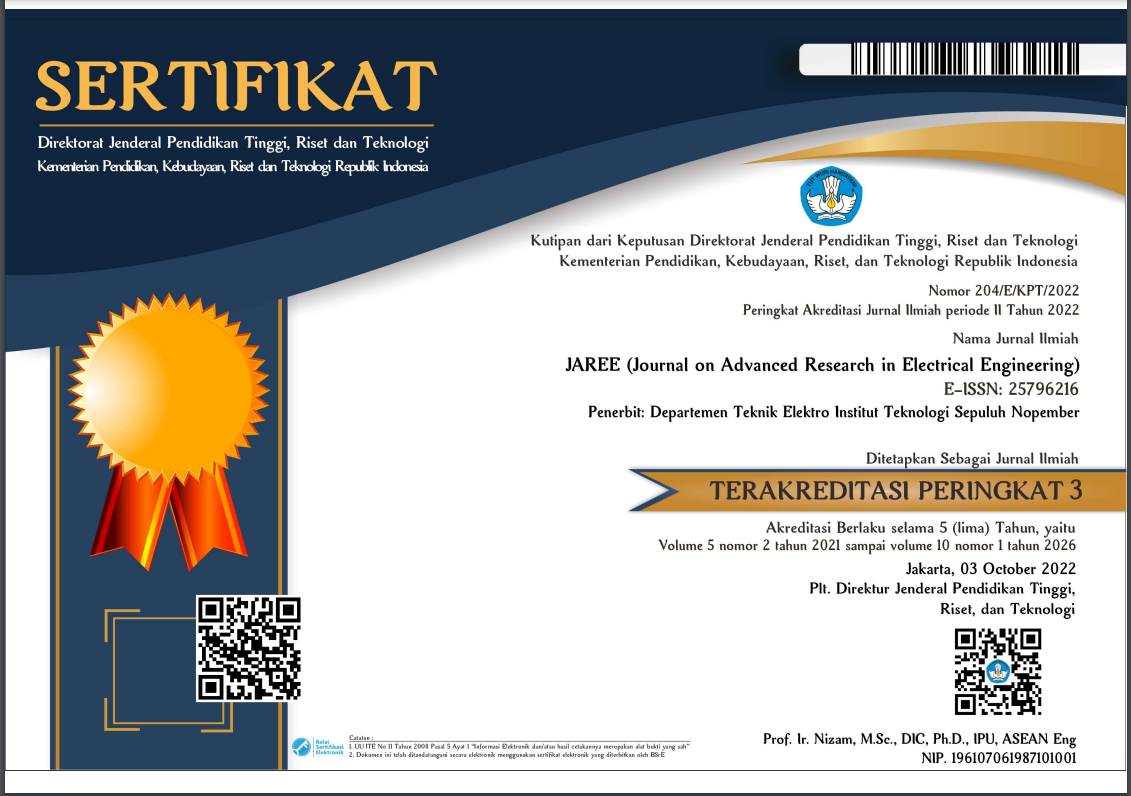Self-Tuning PID-Genetic Algorithm Controller for Steam Drum Boiler Water Level Control System
DOI:
https://doi.org/10.12962/jaree.v5i2.102Abstract
A control system with uncertainty or unpredictable disturbance needs more effort to be controlled. A conventional PID Controller is the most popular method used in industries. It was tuned and adjusted by the designer, and it has fixed parameters during operation. However, the disturbance effect causes the desired system performance unreachable. By using a self-tuning controller, the problem should be tackled. In this paper, the PID-Genetic Algorithm (PID-GA) controller was proposed and tested with the steam drum water level control system of a steam power plant. Variation in power load causes noisy water level characteristics and should be maintained at + 0.4 meters from the setpoint to prevent the power plant trip. From the simulation, PID-GA can reduce disturbance of the minimum, nominal, and maximum load with perturbation peaks 0.18 m, 0.22 m, and 0.26 m respectively.Keywords: genetic algorithm, NWL, PID-GA, steam drum, steam power plant.References
A. Fatoni, J. Susila, I. Arifin, M. A. Hady and R. Rizki, "Comparative Study of Parallel and Cascade Configuration Supervisory Predictive Controller for Water Level Control System with Delay Time," Journal of Mathematics, Statistics and Applications, vol. 1, no. 1, pp. 51-62, 2016.
B. A. Ogunnaike and W. H. Ray, Process Dynamics, Modeling, and Control, New York: Oxford University Press, 1994.
G. Gilman, Boiler Control Systems Engineering 2nd Edition, United States of America: International Society of Automation, 2010.
A. Joseph and J. J. Isaac, "Real Time Implementation of Model Reference Adaptive Controller for a Conical Tank," International Journal on Theoretical and Applied Research in Mechanical Engineering (IJTARME), vol. 2, no. 1, pp. 2319-3182, 2013.
T. Teng, J. Shieh and C. Chen, "Genetic Algorithms Applied in Online Autotuning PID Parameters of a Liquid-level Control System," Transactions of the Institute of Measurement and Control, vol. 25, no. 5, pp. 433-450, 2003.
A. A. A. Emhemed, R. B. Mamat and D. Hanafi, "Comparison of Boiler Plant Model and Real Plant Responses Based on Proportional Integral Controller," in IEEE Conference on Sustainable Utilization and Development in Engineering and Technology (STUDENT), Kuala Lumpur, 2012.
N. Jain and A. Tiwari, "Comparative Study of Fluid Coupling for Oil and Water as Working Fluid," International Journal of Engineering Research and Development, vol. 9, no. 6, pp. 56-65, 2013.
G. J. Silva, A. Datta and S. Bhattacharyya, PID Controllers for Time-Delay System, Birkhauser Boston: USA, 2015.
A. Jayachitra and R. Vinodha, "Genetic Algorithm Based PID Controller Tuning Approach for Continuous Stirred Tank Reactor," Advances in Artificial Intelligence, pp. 1-8, 2014.
Design and Operation Manual Volume 2 Paiton Steam Power Plant Units 1 and 2, America: ABB Combustion Engineering, 1993.
Y. Chen and Y.-J. Y. W.-x. Ma, "Application of Improved Genetic Algorithm in PID Controller Parameters Optimization," Telkomnika, pp. 1524-1530, 2013.
Chipperfield, "Introduction to genetic algorithms," in Genetic Algorithms in Engineering Systems, Stevenage, IEE, 1997, pp. 1-41.
T. Point, "Genetic Algorithms," Madhapur, 2016.
J. Susila, M. Rameli, I. Arifin, A. Fatoni, M. A. Hady and R. Prihandono, "Noise Tolerable PID Controller for Load Frequency Control (LFC) in Multi Area Power Plant," Journal of Instrumentation, Automation and Systems, vol. 2, no. 3, pp. 101-106, 2016.








